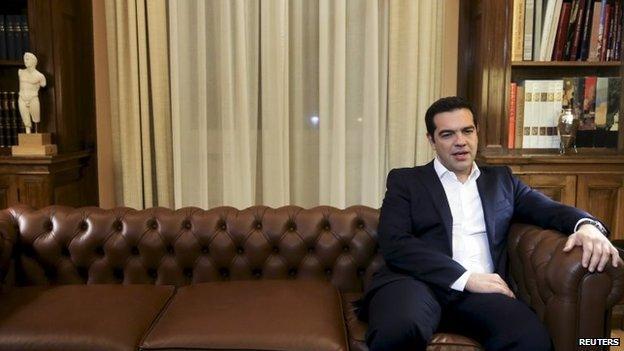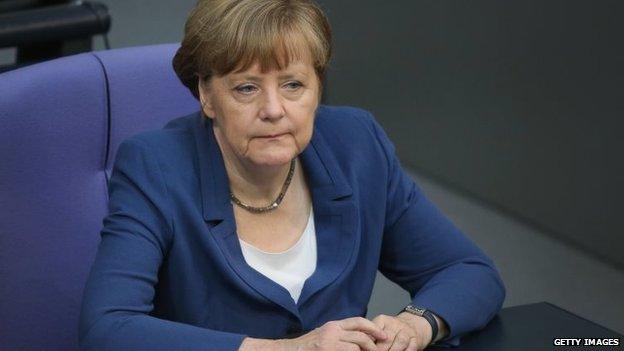Greece votes 'No' and gambles its future
- Published

Greek voters have left many questions for eurozone leaders to answer
Greek voters have delivered a defiant response to Europe. Political leaders and heads of government had lined up to warn the Greeks that a "No" vote would be a vote to leave the euro. It did not deter them. Indeed many voters seemed to revel in their resistance.
The European Project is now facing its gravest crisis.
The size of the "No" vote surprised the Greek government. In the end the voters agreed with Prime Minister Alexis Tsipras that the country's creditors were trying to "asphyxiate" the Greek economy. They bought his argument that a "no" vote would only strengthen his hand in negotiations.
Despite the closed ATMs, the banks on the verge of running out of money and a collapsing economy, Greeks have once again rejected the policy of austerity authored in Berlin and Brussels.
Critical days
It leaves German Chancellor Angela Merkel facing the deepest challenge of her nearly 10 years in power. Over the next 48 hours she must make a series of choices; choices that will determine whether she can keep the eurozone together.
Mr Tsipras also faces critical days ahead that will require political sensitivity and skill that he has not shown so far.
On Tuesday evening Angela Merkel will fly to Paris for dinner with French President Francois Hollande. Despite the parade of unity there have been differences in emphasis between the French and German leaders. President Hollande said before the referendum "we need to be clear, the time for a deal is now." Angela Merkel said "a good European is not somebody who looks for agreement at any price."
Inside the French cabinet there are those who believe they need to re-open talks with Mr Tsipras. Mr Hollande has already spoken to the Greek leader. The Italians are pushing for talks to be resumed.

Some in the German establishment hoped Alex Tsipras would not survive the referendum
Angela Merkel's position is more difficult. If she enters negotiations on a new bailout deal with the Greek government then she would have to seek parliamentary approval in the Bundestag. Almost certainly she would get it but it would expose growing resentment towards Greece inside Germany and it is clear a significant number of politicians, officials and economists believe Greece should leave the euro.
Hans Michelbach, a senior MP from the Conservative CSU, has already said "now one has to question whether Greece would not be better off outside the eurozone." Deputy Chancellor Sigmar Gabriel said that not only were "new negotiations difficult to imagine" but that Mr Tsipras had "torn down the last bridges on which Greece and Europe could move towards a compromise."
Inside Germany trust in the Greek leader has evaporated; many MPs simply do not believe his commitments to implement reforms. Many in the German political establishment had been hoping for a "Yes" vote with Mr Tsipras being replaced by a technocratic government. Now once again they will have to deal with a man they mistrust.
New deal?
After the meeting in Paris there will be an emergency summit of eurozone leaders in Brussels on Tuesday. There is little optimism. The leader of the eurogroup of finance ministers Jeroem Dijsselbloem described the result of the vote as "very regrettable for the future of Greece. For the recovery of the Greek economy, difficult measures and reforms are inevitable."
So negotiations are likely to resume but it is unclear what precisely they will be talking about. The EU/IMF deal is no longer on the table. The Greek side are hinting that they may be willing to compromise on some of the cuts demanded but only if there is an agreement to discuss debt re-structuring.
Mr Tsipras believes his hand has been strengthened after an IMF report signalled that Greek debt was unsustainable. But the eurogroup will insist that Greece commit to verifiable budget and structural reforms.

Angela Merkel does not want a Greek exit under her watch
At least one European leader has decided that Greece should leave the eurozone. There may be others. The mood against the Tsipras government has hardened.
That having been said there is still a willingness to talk and find a compromise.
Imagination required
Angela Merkel does not want to preside over a Greek exit which would severely damage the reputation of the eurozone and tarnish her period as German chancellor. Even though there are advisers who believe it is best for Greece to exit the eurozone, other officials have warned her that a Greek exit would be far from cost free.
There are no good options and there is little time. The Greek economy is in free fall and the banks - without further liquidity assistance from the ECB - will collapse. Indeed the economic situation has deteriorated so sharply that any bailout deal will have to be toughened. On 20 July Greece has to pay over 3bn euros to the ECB. If it defaults the Central Bank will withdraw all funding of Greek banks.
The truth that has not been shared with German voters is that Greece will need a third bailout if it is ever to recover. How much will be needed? Perhaps 50bn over the next three years. As it stands Greece's debt is not sustainable and no deal will survive unless it is addressed.
In the next few days Europe's leaders will have to show imagination and boldness to save Greece and to save the reputation of the European Project.